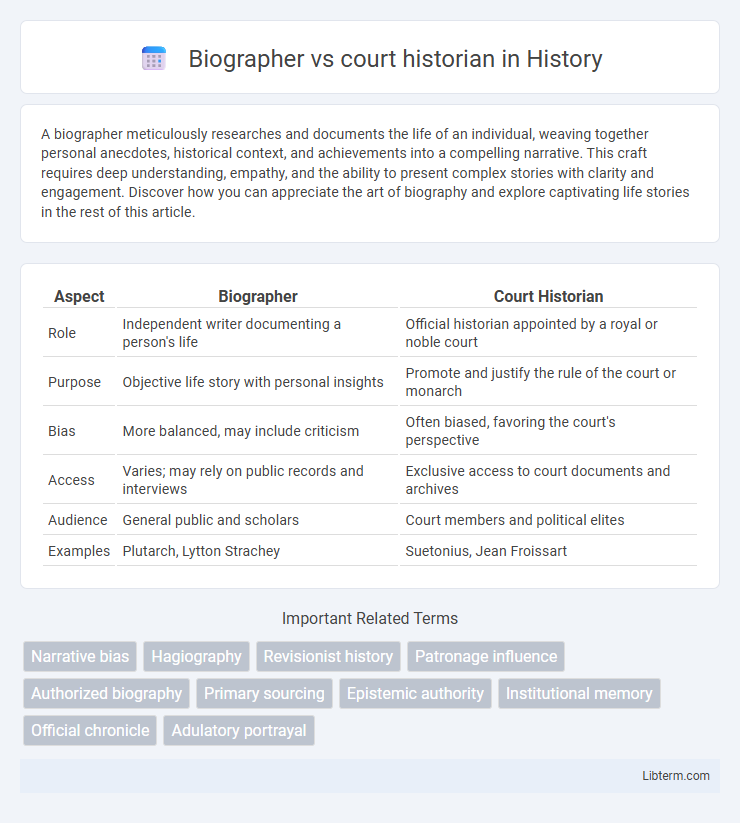A biographer meticulously researches and documents the life of an individual, weaving together personal anecdotes, historical context, and achievements into a compelling narrative. This craft requires deep understanding, empathy, and the ability to present complex stories with clarity and engagement. Discover how you can appreciate the art of biography and explore captivating life stories in the rest of this article.
Table of Comparison
| Aspect | Biographer | Court Historian |
|---|---|---|
| Role | Independent writer documenting a person's life | Official historian appointed by a royal or noble court |
| Purpose | Objective life story with personal insights | Promote and justify the rule of the court or monarch |
| Bias | More balanced, may include criticism | Often biased, favoring the court's perspective |
| Access | Varies; may rely on public records and interviews | Exclusive access to court documents and archives |
| Audience | General public and scholars | Court members and political elites |
| Examples | Plutarch, Lytton Strachey | Suetonius, Jean Froissart |
Definition of Biographer and Court Historian
A biographer is an author who writes detailed accounts of an individual's life, emphasizing personal experiences, character, and significant events. A court historian, by contrast, is an official appointed to document the history and affairs of a royal court or government, often with a focus on political events and state matters. Both roles serve to preserve historical narratives, but the biographer centers on personal biography while the court historian concentrates on institutional history.
Historical Roles and Responsibilities
Biographers meticulously research and document personal lives, shaping individual legacies through detailed narratives and critical analyses. Court historians operate within royal or governmental settings, crafting official records that legitimize and glorify ruling authorities by emphasizing political and cultural achievements. Both roles demand accuracy and context, yet biographers prioritize personal truth while court historians aim to reinforce institutional power and historical continuity.
Objectivity vs. Allegiance
Biographers prioritize objectivity by critically analyzing sources to present a balanced, multifaceted portrayal of their subjects, often exposing flaws alongside achievements. Court historians, in contrast, maintain allegiance to their patrons, crafting narratives that reinforce the ruler's legitimacy and glorify their reign, frequently omitting controversial or negative aspects. This divergence impacts historical accuracy, with biographers striving for comprehensive truth while court historians produce state-sanctioned versions of events.
Sources and Research Methods
Biographers rely heavily on primary sources such as letters, diaries, and personal interviews to construct detailed, intimate portraits of individuals, emphasizing subjective experiences and personal narratives. Court historians prioritize official documents, state records, and formal archives to produce authoritative accounts that reflect political contexts and institutional perspectives. Both employ rigorous research methods, but biographers often incorporate interpretive analysis of emotional and psychological factors, while court historians focus on corroborating factual accuracy within broader historical frameworks.
Influence of Patronage
Patronage significantly shapes the work of both biographers and court historians by determining the scope, perspective, and tone of their narratives. Court historians often serve rulers directly, producing accounts that emphasize the achievements and legitimacy of their patrons, while biographers may have more freedom but still rely on patronage for access to personal archives and support. The influence of patronage can lead to biased portrayals, with court historians promoting state agendas and biographers balancing factual integrity with the expectations of influential sponsors.
Purpose of Their Writings
Biographers aim to provide a detailed, personal, and often nuanced account of an individual's life, emphasizing character development and personal experiences to create a comprehensive narrative. Court historians focus primarily on documenting official events, state affairs, and public deeds, often highlighting political achievements and legitimizing the ruling authority. The purpose of biographers is to explore the subject's inner world and motivations, while court historians serve to reinforce the prevailing power structure and historical record from a governmental perspective.
Impact on Public Perception
Biographers shape public perception by offering detailed, nuanced portraits of individuals, emphasizing personal motivations, struggles, and achievements that resonate emotionally with readers. Court historians often influence public perception by presenting officially sanctioned narratives that reinforce the legitimacy and authority of ruling powers, potentially limiting critical analysis. The interplay between independent biographers and court historians highlights the dynamic tension between subjective interpretation and official historiography in shaping historical understanding.
Challenges in Accuracy and Bias
Biographers often face challenges in accuracy due to limited access to personal documents and the subject's subjective memories, which can introduce bias or gaps in the narrative. Court historians contend with pressures from ruling authorities to portray events favorably, leading to potential distortions or omissions that compromise historical integrity. Both roles require critical evaluation of sources to navigate bias and present reliable accounts.
Evolution Over Time
Biographers emerged as independent narrators focused on individual lives, emphasizing personal achievements and psychological depth, while court historians traditionally served monarchs by documenting official state events and reinforcing royal legitimacy. Over time, biographers adopted critical analysis and diverse perspectives reflecting societal changes, whereas court historians gradually incorporated broader historical contexts beyond propaganda. This evolution highlights a shift from authoritative record-keeping toward more nuanced, interpretive storytelling in historical writing.
Modern Relevance and Examples
Biographers provide detailed, personal narratives about individuals, emphasizing psychological insights and anecdotal evidence, making their work highly relevant for contemporary readers seeking nuanced human stories; examples include Robert Caro's extensive biographies of political figures. Court historians, often employed by governments or royal institutions, focus on documenting official histories and legitimizing authority through a formal, state-sanctioned perspective, as seen in the works commissioned by monarchies or regimes like the Soviet Union's official historians. In modern times, biographers influence public perceptions of historical figures, while court historians shape national identity and governmental narratives, reflecting differing objectives and methods in historical documentation.
Biographer Infographic

 libterm.com
libterm.com